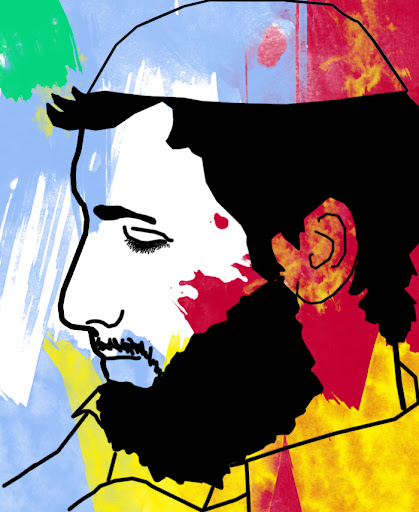I consider my Yiddish to be fairly good.
I have a rather decent vocabulary, especially when supplemented
with various Hebrew, Russian, and Polish words that I know . . .
Yet despite the fact that I can learn a sicha with ease . . . even hold a rather full conversation in Yiddish . . . it still pales to what a ‘Good’ Yiddish ought to be.
Speaking to R’ Duvid ingehat miydelach!”
[For some reason, I don’t think he had either] )

Reb Duvid puts on tefillin for the first time in sixty years.
The secretary of Chabad in
that would put most Detroit’niks to shame.
I don’t think the problem is vocabulary . . .
Yiddish is a fluid language, it picks up words from every
country that it’s come in contact with –France, Old Slavic, Polish, Russian,
Hungarian . . . you name it, we have it. As long as someone isn’t asking to “Effen
di Vindow” the occitional English word doesn’t hurt –it can even add.
I think in English, even though for the most part when I speak in Yiddish my thoughts are in Yiddish,
it’s only on a superficial level. Were I to think any deeper for a moment, it would be in my Mama Loshon.
I have an excuse, or at least that’s what I tell myself. After all,
I didn’t begin to learn Yiddish until I was 17 . . . and I am for the
most part self-taught. But why is it that the average Lubavitcher can’t?
Most Americans learn at some point, but Israelis . . . forget
about it.
(As a side note, it’s not only a problem with us –Ger as well as several others are afflicted with the same problem)
Technorati Tags: Yiddish








3 comments:
yeah, i think yiddish should become a serious language again...one of the reasons for me would be because in HS whenever someone spoke to their parents it would be in spanish, korean, armenian, russian...and i wouldnt be able to understand a thing..and when i spoke in english to mom..EVERYONE understood...if only i had known yiddish so i could complain to her without people knowing .. like "mommmyy ccann i have chooocccoollatteeee?" without..embarrassing myself.
and dont forget my english teacher Mrs. Humphries. she thought yiddish was dead like latin..
really, its sad. assimilation can be a terrible thing..
The point is not so much reviving Yiddish, but rather making it more active.
"really, its sad. assimilation can be a terrible thing.."
I'm glad you agree.
Post a Comment